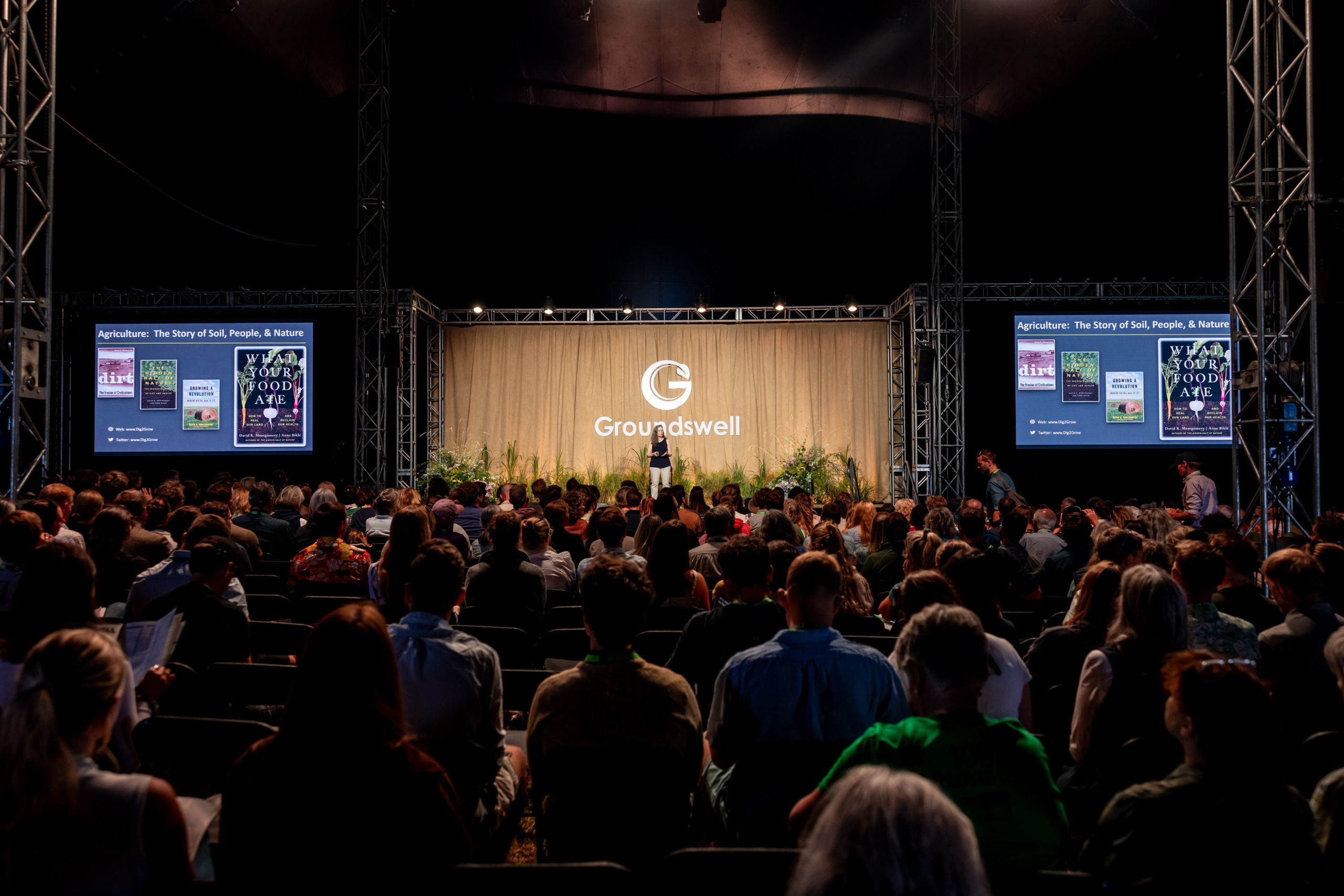From understated boutique gatherings celebrating our love of everything from food to flowers to full-on experiences like Glastonbury, summer events and festivals are firmly ingrained into the British way of life.
When the Cherry farming family launched the Groundswell event nine years ago, 500 farmers attended. Fast forward to this year’s festival, which will take place 26th and 27th of June, and a staggering 8,000 people are expected to pull on their boots and attend.
Groundswell has become the go-to event to learn about regenerative farming, which is all about working with the soil to reduce reliance on tillage and pesticides, and other artificial inputs, to improve both yields and profitability.
The programme for the two days is now available to view online with over 175 sessions taking place across 10 main venues and other locations around the Festival.
“The speaker line-up this year is world-class with an incredible array of voices across the regen ag space, it’s fantastically exciting to look through it and realise how much knowledge and experience there is to be shared, we can’t wait to put everyone in a field together!” says Alex Cherry, Event Director.
“We are anticipating an even larger crowd staying onsite this year with camping spots nearly sold out already, we’re glad to have made the investment in water and site infrastructure to enable a comfortable experience for everyone”.
“Groundswell is a very welcoming and inclusive event, attracting farmers running a broad range of farm businesses from all over the UK and beyond. People have described having life changing experiences and we get people coming back year after year. One visitor even met his wife at Groundswell; he proposed to her back at the event the next year.”
The excitement is so palpable that Ohioan Amish farmer John Kempf – regarded by many as a globally leading voice of regenerative farming – is flying in to speak at this year’s Groundswell.
Kempf is founder and chief vision officer for Advancing Eco Agriculture, a company that empowers growers to implement scalable regenerative agriculture solutions that create extraordinary results. He started the company in 2006 following a major shift in how he began managing his family’s farm. The story begins during the 2004 growing season when his father – a pesticide supplier who trialled the products on his own land – rented a field from a neighbouring farmer.
“At harvest time, powdery mildew had infected 80 percent of our plants grown in the soil we had farmed for a decade using intense pesticide applications,” explains John.
“On the rented field, which had been farmed on a rotational system without pesticide applications, there was no powdery mildew. There was a knife-line effect right down the centre. The vines were the same variety, planted the same day, same fertiliser applications, same fungicide applications, but two completely different outcomes.”
This experience followed a three-year period when the Kempf family lost nearly 70 per cent of their four primary crops to disease and insects. This set John on a learning journey that led to him start AEA and the now top-rated Regenerative Agriculture Podcast, which he hosts and shares his knowledge on, along with his guests.
“My aim is to put the joy back into farming by empowering farmers to grow crops that are more productive, resilient and profitable,” explains John, who adds: “I am looking forward to connecting with the many innovative British growers I have had conversations with, sharing what we’re learning at AEA, and learning about UK regenerative agriculture while I’m over in the country.”
From Finland, Professor Anna Krzywoszynska will be taking to the stage. Her research focus is environmental knowledge and sustainable food systems. She is the founder of a community for the soil-curious, known as the Soil Care Network.
“We need to start to understand what it would mean to produce food in a way that supports the needs of soil, rather than making soil support the needs of agriculture,” says Anna. “We need to think about what soil needs from farming, rather than what farming needs from soil.”
Anna will be joined by Professor Tim Benton in looking at our uncertain world and how it will drive the future food supply system. He leads the Environment and Society Programme at London-based international think tank Chatham House. A leading advocate on food systems transformation, he has worked as an advisor with UK governments, the EU, G20 and many others.
Josef Holzer, who is described as a “permaculture legend,” is coming from the Austrian Alps to speak at Groundswell. His session, entitled Where water runs, make it walk will share the lessons learnt from the water retention systems he has cascading around his farm.
“To reduce the adverse impact of dry periods, as much rainfall as possible needs to be retained during heavy periods of rain,” explains Josef.
The programme also includes husband-and-wife farmers Derek and Tannis Axten, who will share how improving their soil health has made their farm more profitable, enabling them to build a food-grade seed cleaning plant, flour mill, and packaging line to add value to their grain. This has, in turn, brought knock-on benefits for the local community and wider economy.
Groundswell has been a sellout event every year since its launch. Tickets are now on sale at www.groundswellag.com

